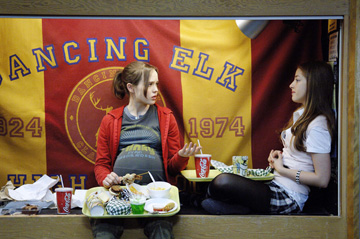 Update 1/7/08:
Update 1/7/08: If you’re visiting from
Electrolicious,
Ypulse, or elsewhere today, welcome. In case you’re interested, the
main site is here, and the other
collected movie reviews are here (including the
best of 2007 list.)
“That ain’t no etch-a-sketch. That’s one doodle that can’t be un-did, homeskillet.” If you find people talking in such overstylized hipster-speak for ninety minutes witty and/or adorable, you’ll probably enjoy Jason Reitman’s Juno quite a bit more than I did. While it’s not a bad film, and it has the advantage of clever repartee and appealing performances across the board, Juno — like everyone’s favorite indy comedy last year, Little Miss Sunshine — is, IMHO, being significantly overpraised. Suffering from dialogue that’s been stylized within an inch of its life, and with every scene festooned with kitschy pop culture bric-a-brac and scored to uber-sensitive indy rock, I came to find Juno cloying to the point of claustrophobia. (And hearing The Kinks (“A Well-Respected Man”) and those overlords of twee, Belle & Sebastien (“Piazza, New York Catcher”), at various points on the soundtrack only confirmed the sensation that I’d somehow wandered into a Wes Anderson after-school special.) Speaking of Wes, I feel about this film much as I did about The Darjeeling Limited — if this is your sort of thing, have at it. But I for one eventually grew exhausted and even somewhat annoyed with Juno, even as I found myself in sympathy with its denouement.
 Juno begins with a chair. A recliner at a yard sale, in fact, which is being eyed by a Sunny D-chugging teenager named Juno MacGuff. (Ellen Page of Hard Candy and X3 — This role will no doubt cement her status as the new sassy, quick-witted, adorable-but-approachable brunette that middle-school fanboy types will crush over, a la Princess Leia, Winona Ryder, and Natalie Portman in their day.) As it turns out, this chair has a special meaning for Ms. MacGuff, since it was one quite like it where she and her nerdy best friend Paulie Bleeker (Michael Cera of Arrested Development and Superbad, in his wheelhouse and terrific) lost their virginity in a fit of (what’s being billed as) boredom. And now, two months later, Juno is, as the sayings go, knocked up, preggers, in the family way, with a bun in the oven. (She later memorably deems herself “the cautionary whale.”) What to do?
Juno begins with a chair. A recliner at a yard sale, in fact, which is being eyed by a Sunny D-chugging teenager named Juno MacGuff. (Ellen Page of Hard Candy and X3 — This role will no doubt cement her status as the new sassy, quick-witted, adorable-but-approachable brunette that middle-school fanboy types will crush over, a la Princess Leia, Winona Ryder, and Natalie Portman in their day.) As it turns out, this chair has a special meaning for Ms. MacGuff, since it was one quite like it where she and her nerdy best friend Paulie Bleeker (Michael Cera of Arrested Development and Superbad, in his wheelhouse and terrific) lost their virginity in a fit of (what’s being billed as) boredom. And now, two months later, Juno is, as the sayings go, knocked up, preggers, in the family way, with a bun in the oven. (She later memorably deems herself “the cautionary whale.”) What to do?
At first, Juno considers “procuring a hasty abortion,” but something about the waiting room at Women Now! gives her the heebie-jeebies. And so, after some discussion with her best friend (Olivia Thirlby of United 93, an appealing presence), Juno decides to go for it and have the baby. She informs her parents (J.K. Simmons and Allison Janney, both excellent) and finds a baby-craving couple on the right side of the tracks (Jason Bateman and an impressive Jennifer Garner — she and Cera are the best parts of the film) to handle her spawn in its post-born phase. But, of course, it’s never that easy. For one, it turns out the Lorings may not be as ideal a couple as they first appear. (The wedding pics everywhere should be a tip-off, as they were in In Good Company.) For another, Juno slowly comes to discover that certain things — bearing a child, falling in love — are actually much harder than they’re made out to be on the TV and the Internets, and all the clever comebacks in the world aren’t going to protect you when life takes a painful turn.
 Now, some caveats. First, Ellen Page’s Juno is basically a pop-culture variant of the hyperliterate teenagers you find in Whit Stillman’s Metropolitan or Wes Anderson’s Rushmore, and, as I’ve said before, I am really not a big fan of that genre. Page is as good as she can be in the role, but the character as written is drowning in self-conscious quirk. Now, as my brother pointed out, so was Ferris Bueller back in the day, so perhaps I’m just getting old. Still, every time Juno emotes wildly over seventies punk rock acts like Iggy and the Stooges or namedrops Dario Argento movies, all I heard was screenwriter Diablo Cody unrealistically foisting her own pop culture bona fides on a sixteen-year-old character. (I had the same problem with Scarlett Johansson karaokeing Roxy Music and The Pretenders in Sofia Coppola’s Lost in Translation.) To borrow from I’m Not There, “Live your own time, child.“
Now, some caveats. First, Ellen Page’s Juno is basically a pop-culture variant of the hyperliterate teenagers you find in Whit Stillman’s Metropolitan or Wes Anderson’s Rushmore, and, as I’ve said before, I am really not a big fan of that genre. Page is as good as she can be in the role, but the character as written is drowning in self-conscious quirk. Now, as my brother pointed out, so was Ferris Bueller back in the day, so perhaps I’m just getting old. Still, every time Juno emotes wildly over seventies punk rock acts like Iggy and the Stooges or namedrops Dario Argento movies, all I heard was screenwriter Diablo Cody unrealistically foisting her own pop culture bona fides on a sixteen-year-old character. (I had the same problem with Scarlett Johansson karaokeing Roxy Music and The Pretenders in Sofia Coppola’s Lost in Translation.) To borrow from I’m Not There, “Live your own time, child.“
 For another, and as Lauren Wissot pointed out at THND, every character in the film — with the exception of Jennifer Garner’s earnest yuppie mom-wannabe, who is defined mostly by its absence — speaks with the same arch, cynical, highly referential voice, spewing forth peppy bon mots and pop-culture zingers that tend to read a lot better on the page than they sound on screen. “Silencio, old man,” “I have to pee like Seabiscuit,” “The baby looks like a Sea Monkey right now,” “Thundercats are go!” Everyone from Juno’s parents to her girlfriend to her lab partners to Rainn Wilson at the Circle K indulge in this hyperstylized quipping to the point of exhaustion, including the director. (Check out the “jocks really love goth librarians” scene, for example.) Now, this is the exact same problem I have with most of Joss Whedon’s output and particularly Buffy the Vampire Slayer, so undoubtedly fans of the latter may have more of a tolerance for Juno‘s endless string of impeccably-crafted, unrealistic-as-delivered witticisms. Still, Juno eventually reminded me of the exchange in Fight Club when Ed Norton makes the crack about people on planes being “single-serving friends.” Says Pitt: “Oh I get it, it’s very clever. How’s that working out for you? Being clever. Great, keep it up then…“
For another, and as Lauren Wissot pointed out at THND, every character in the film — with the exception of Jennifer Garner’s earnest yuppie mom-wannabe, who is defined mostly by its absence — speaks with the same arch, cynical, highly referential voice, spewing forth peppy bon mots and pop-culture zingers that tend to read a lot better on the page than they sound on screen. “Silencio, old man,” “I have to pee like Seabiscuit,” “The baby looks like a Sea Monkey right now,” “Thundercats are go!” Everyone from Juno’s parents to her girlfriend to her lab partners to Rainn Wilson at the Circle K indulge in this hyperstylized quipping to the point of exhaustion, including the director. (Check out the “jocks really love goth librarians” scene, for example.) Now, this is the exact same problem I have with most of Joss Whedon’s output and particularly Buffy the Vampire Slayer, so undoubtedly fans of the latter may have more of a tolerance for Juno‘s endless string of impeccably-crafted, unrealistic-as-delivered witticisms. Still, Juno eventually reminded me of the exchange in Fight Club when Ed Norton makes the crack about people on planes being “single-serving friends.” Says Pitt: “Oh I get it, it’s very clever. How’s that working out for you? Being clever. Great, keep it up then…“
 Now, this reaction posed a bit of a quandary for me, since, as y’all probably know, Juno is not the first unplanned-pregnancy-for-a-hipster-parent comedy to come down the pike this year. And when musing on Knocked Up over the summer, I put its many knowing pop-culture references — jokes involving Matthew Fox and Robin Williams’ knuckles, for example — in the plus column. So why can’t a 16-year-old girl make the same sort of wry cultural asides to her friends as a 23-year-old man-child? I guess the main difference is that I don’t remember Knocked Up being so wall-to-wall with the punchy quips, or the dialogue feeling so writerly or artificial throughout. (For example, there’s nothing that feels as true-to-life in Juno as the automobile argument in Apatow’s film.) Until I see Knocked Up again, that’s my story and I’m sticking to it.
Now, this reaction posed a bit of a quandary for me, since, as y’all probably know, Juno is not the first unplanned-pregnancy-for-a-hipster-parent comedy to come down the pike this year. And when musing on Knocked Up over the summer, I put its many knowing pop-culture references — jokes involving Matthew Fox and Robin Williams’ knuckles, for example — in the plus column. So why can’t a 16-year-old girl make the same sort of wry cultural asides to her friends as a 23-year-old man-child? I guess the main difference is that I don’t remember Knocked Up being so wall-to-wall with the punchy quips, or the dialogue feeling so writerly or artificial throughout. (For example, there’s nothing that feels as true-to-life in Juno as the automobile argument in Apatow’s film.) Until I see Knocked Up again, that’s my story and I’m sticking to it.
Also, while Juno is being billed in some corners as the female response to Knocked Up, it is and it isn’t. Obviously, the parent drenched in pop-culture irony this time is female, but in other ways the films are rather similar in their gender portrayals: The relationship dynamic between Garner and Bateman for example, plays quite a bit like the one between Leslie Mann and Paul Rudd in Knocked Up — She’s the Voice of Responsiblity, he wants to keep playing with his toys. At any rate, while I prefer the former, Knocked Up and Juno would probably make a quality double-feature in the future. If nothing else, they’ll help pop-culture aficionados of both sexes figure out what to expect when they’re expecting. Just make sure you have insulin or ipecac handy in case the overwritten, indy-pop sentimentalism of Juno proves too sugary-sweet, as it did for me.
 “Hillary Clinton ended January with $7.6 million in debt – not including the $5 million personal loan she gave to her campaign in the run-up to the critical Super Tuesday elections, according to financial reports released Wednesday.” With the January FEC reports filed, Politico takes a look at the sinking fiscal ship that is the Clinton campaign. The key graphs: “According to the reports, Clinton raised about $20 million in January, including her loan. She spent nearly $29 million during the month. She reported a cash balance of $29 million. But more than $20 million of that is money dedicated to the general election. Her personal loan accounts for more than half of the remaining approximately $9 million, leaving just about $4 million in cash raised from donors. But even that money is illusionary when measured against the reported $7.6 million in debts.” So add that all up and you get: no money. (Hence, the fatcat 527.) But the silver lining for Sen. Clinton? At least she’s making interest on that loan.
“Hillary Clinton ended January with $7.6 million in debt – not including the $5 million personal loan she gave to her campaign in the run-up to the critical Super Tuesday elections, according to financial reports released Wednesday.” With the January FEC reports filed, Politico takes a look at the sinking fiscal ship that is the Clinton campaign. The key graphs: “According to the reports, Clinton raised about $20 million in January, including her loan. She spent nearly $29 million during the month. She reported a cash balance of $29 million. But more than $20 million of that is money dedicated to the general election. Her personal loan accounts for more than half of the remaining approximately $9 million, leaving just about $4 million in cash raised from donors. But even that money is illusionary when measured against the reported $7.6 million in debts.” So add that all up and you get: no money. (Hence, the fatcat 527.) But the silver lining for Sen. Clinton? At least she’s making interest on that loan.






